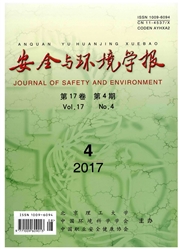

 中文摘要:
中文摘要:
垃圾焚烧产生的二噁英严重危害人体健康.人体摄入二噁英的途径包括土壤摄入、空气吸入、皮肤接触和食物吸收.首先,计算地面空气和土壤中二英浓度 然后,由噁蒙特卡罗模拟得到二噁英摄入量,并进行敏感性分析 最后,进行致癌、非致癌健康风险评估.蒙特卡罗模拟结果表明,食物是人体摄入二噁英的最主要来源,其他3种暴露途径所摄入二噁英非常少.对食物摄入进行敏感性分析可得,牲畜和家禽摄入量对二噁英摄入影响最大.因此,通过合理调节饮食结构可极大降低二噁英摄入量,减少对人体健康的影响.风险计算结果表明,致癌风险值为2.80× 10-5,小于最大可接受风险值10-4 非致癌风险值为2.80× 10-2,小于可接受风险值1.因此,从致癌风险和非致癌风险的角度考虑,该垃圾焚烧厂产生二噁英不会对附近人群健康产生明显不利影响.
 英文摘要:
英文摘要:
Dioxin emissions from municipal waste incinerations have caused great concern of local habitants and severe hazards to human health. The objectives of this paper were to assess the carcinogenic and risks of incinerator-emitted dioxins across multi- media and multi-pathways. The dioxin absorption pathways include inhalation of contaminated soil, air inhalation, dermal absorption ex- posure and ingestion through diet, The emissions were firstly estimat- ed from regulatory measurements. The dioxin concentration of soil was calculated by using well documented model and the ambient air con- eentration was estimated with a Gaussian dispersion model. Next, the average daily intake of dioxin was obtained by using Monte Carlo sim- alation with multimedia modeling to produce probability distribution of risks. Sensitivity analysis was calculated along with the Monte Carlo sampling to identify key factors that influence the estimation of risk. Subsequently, carcinogenic and non-carcinogenic health risk values were obtained. The sensitivity analysis showed that diet is the domi- nant source of human exposure to Dioxin/Fs, while the other three exposure pathways are very small for Dioxin/Fs exposure. For the in- gestion through diet, animals and poultry consumption have great im- pact on dioxin intake. Therefore, a reasonable adjustment on diet habits can greatly reduce dioxin intake. Risk calculation result shows that the cancer value was 2.80×10^-5 and non-cancer risk value was 2.80×10^-2. The individual excess risk of cancer was less than 10-4 and the hazard ratios for dioxin were less than 1. Therefore, from the view of carcinogenic and non-carcinogenic risks, the municipal solid waste incineration would not bring serious harms to human health.
 同期刊论文项目
同期刊论文项目
 同项目期刊论文
同项目期刊论文
 期刊信息
期刊信息
